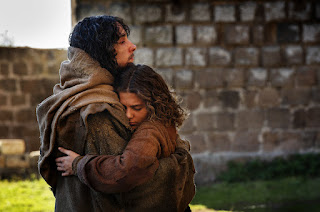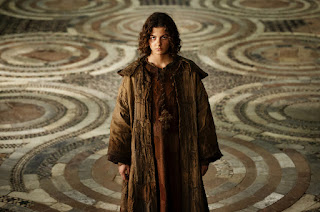Festival edit From Venice to London—which runs from Friday until Monday—takes a selection of titles from the Venice Film Festival and showcases them in London's Curzon Soho (click here for tickets). This special season includes five films which played at the 79th edition of the world's oldest film festival, with all titles presented as UK premieres. The first From Venice to London—which took place in late 2021—featured the likes of Paolo Sorrentino's The Hand of God and Maggie Gyllenhaal's The Lost Daughter, and the lineup for this second edition includes an equally impressive clutch of titles, one of which is Susanna Nicchiarelli's Chiara. Incidentally, Chiara is one of three films in the festival with a woman's name as its title—the other two being Carolina Cavalli's Amanda and Andrea Pallaoro's Monica; From Venice to London 2023 is rounded out by Benedetta Argentieri's documentary The Matchmaker and Pippo Mezzapesa's Burning Hearts.
Like Nicchiarelli's fine 2017 film Nico, 1988 and her follow-up feature Miss Marx, Chiara is both a biopic and a Belgian co-production; also as with the two earlier films, Chiara sees Nicchiarelli draw a knockout performance from the actress playing the title character, with My Brilliant Friend star Margherita Mazzucco delivering a mesmerising turn as the eponymous Italian saint. Chiara charts the life of Clare (Chiara) of Assisi, follower of the substantially more famous Francis of Assisi and founder of the religious order we now know as the Poor Clares. As far as anyone knows, Clare was the first woman to write a set of monastic guidelines, and her egalitarian nature is very much at the forefront of Nicchiarelli's film. It's a strange, beguiling work, one which recalls Bruno Dumont's Jeannette as the religious austerity that is the film's stock-in-trade is punctuated by the occasional musical number. While not without humour, Chiara leans away from the kind of tropes familiar from other, more excitable films detailing cloistered life, such as Paul Verhoeven's Benedetta and Ken Russell's The Devils, and is all the better for it.
Behaviour that is light years away from Chiara's saintly conduct is dissected in Argentieri's absorbing The Matchmaker, which attempts to fathom the strange case of young student Tooba Gondal. In 2015, Gondal left London to join ISIS in Syria, from where she allegedly worked on persuading Western women to marry jihadist fighters. Argentieri's film begins in 2019 with Kurdish-led coalition troops completing the rout of ISIS, a development which led to thousands of women and children being detained in refugee camps—such as the one on the outskirts of the Syrian town of Ayn Issa, which is where the filmmaker finds Gondal and her two infant children. Most of the film takes place in this camp, where Argentieri observes Gondal's daily routine and quizzes her subject on the events of the previous few years. Gondal is quite happy to answer these questions, and she comes across as affable and repentant—but it is hard to reconcile this person with the one who, inter alia, rejoiced in the aftermath of the Paris Bataclan attacks. The film frequently highlights Gondal's highly incriminating social media past, and it is left to the viewer to decide if The Matchmaker's subject has fully turned her back on extremism; as with all good documentaries, Benedetta Argentieri's film is certain to spark debate.
Darren Arnold
Images: 01 Distribution











.jpg)












